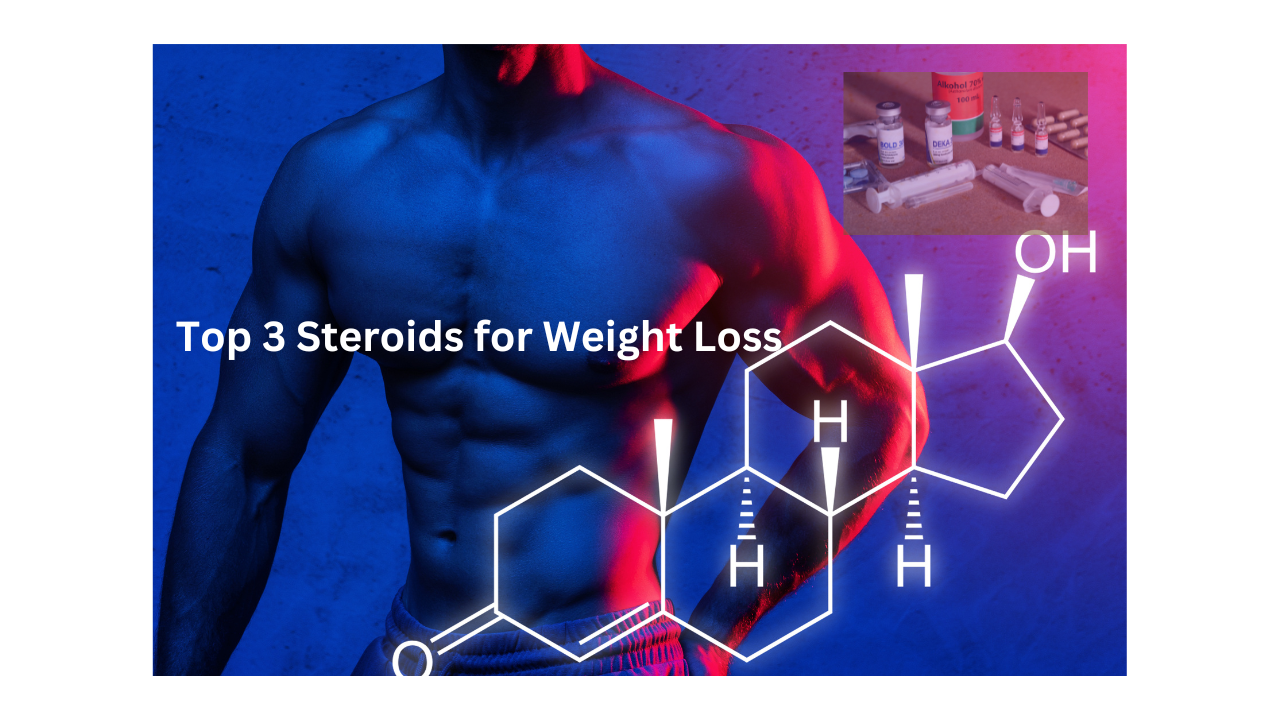Disclaimer: The following article is only for educational purposes and does not promote the use of illegal steroids. Steroids can have serious health risks and should only be used under the guidance of a qualified healthcare professional for legitimate medical purposes.
Table of Contents
Introduction : Understanding Steroids
What Are Steroids?

Steroids, technically known as anabolic-androgenic steroids (AAS), are synthetic variations of the male sex hormone testosterone. They are commonly used to promote muscle growth, enhance strength, and improve athletic performance.
Steroids are commonly used by athletes, bodybuilders, and individuals seeking to improve their physical appearance or athletic abilities. They work by binding to specific receptors in cells throughout the body, including muscle cells, where they stimulate protein synthesis and promote the growth of muscle tissue.
In addition to their anabolic effects, steroids also have androgenic effects, which are responsible for the development of male characteristics such as facial hair, deep voice, and increased libido. While steroids may offer certain benefits in terms of muscle growth, strength, and performance, they also come with a range of potential risks and side effects.
It’s crucial to understand that the use of steroids for non-medical purposes, such as performance enhancement or aesthetic purposes, is not only illegal but also dangerous. Steroids should only be used under the guidance of a qualified healthcare professional for legitimate medical purposes, such as treating hormonal imbalances or certain medical conditions.
 Steroids, often referred to as performance-enhancing drugs, are a topic of much discussion and controversy in the realm of sports, fitness, and bodybuilding. While they may offer certain benefits in terms of muscle growth and athletic performance, it’s essential to understand the potential risks and implications associated with their use.
Steroids, often referred to as performance-enhancing drugs, are a topic of much discussion and controversy in the realm of sports, fitness, and bodybuilding. While they may offer certain benefits in terms of muscle growth and athletic performance, it’s essential to understand the potential risks and implications associated with their use.
Steroids for Weight Loss
 While there are steroids that may have some impact on weight loss due to their effects on metabolism and fat oxidation, it’s important to note that the use of steroids for weight loss is not recommended and can be associated with serious health risks. Additionally, many steroids are not specifically designed for weight loss purposes, and their use for this purpose is considered off-label and potentially unsafe.
While there are steroids that may have some impact on weight loss due to their effects on metabolism and fat oxidation, it’s important to note that the use of steroids for weight loss is not recommended and can be associated with serious health risks. Additionally, many steroids are not specifically designed for weight loss purposes, and their use for this purpose is considered off-label and potentially unsafe.
Some steroids that are commonly associated with weight loss and fat loss effects include:
Clenbuterol: While not a steroid in the traditional sense, clenbuterol is often used by bodybuilders and athletes for its thermogenic properties, which can help increase metabolism and burn fat.
Anavar (Oxandrolone): Anavar is a mild anabolic steroid that is sometimes used for cutting cycles, where the goal is to reduce body fat while preserving lean muscle mass.
Winstrol (Stanozolol): Winstrol is another steroid that is often used during cutting cycles to help reduce body fat and enhance muscle definition.
It’s important to emphasize that the use of steroids for weight loss is associated with significant risks, including liver damage, cardiovascular issues, hormonal imbalances, and other adverse effects. These risks outweigh any potential benefits, and individuals should avoid using steroids for weight loss purposes without the guidance of a qualified healthcare professional. Instead, focus on adopting a healthy diet and exercise regimen for safe and sustainable weight loss.
The Risks of Steroid Use

Steroids, particularly when used improperly or in excessive doses, can lead to a range of severe side effects that can have serious implications for health. Some of the most significant and potentially life-threatening side effects of steroid use include:
Cardiovascular Issues: Steroids can increase the risk of heart-related complications such as high blood pressure, heart attacks, stroke, and blood clots. Prolonged steroid use can also lead to the development of atherosclerosis, a condition characterized by the narrowing of blood vessels due to the buildup of plaque.
Liver Damage: Steroids can strain the liver and lead to liver damage or dysfunction. This can manifest as elevated liver enzymes, jaundice (yellowing of the skin and eyes), liver tumors, and liver failure.
Hormonal Imbalances: Steroid use can disrupt the body’s natural hormonal balance, leading to a range of hormonal imbalances. In men, this can result in decreased testosterone production, testicular atrophy, and infertility. In women, it can cause menstrual irregularities, infertility, and masculinization (virilization) symptoms such as deepening of the voice and growth of facial hair.
Psychological Effects: Steroid use has been associated with mood swings, irritability, aggression, and psychiatric disorders such as depression, anxiety, and psychosis. These psychological effects can have a significant impact on mental well-being and quality of life.
Gastrointestinal Issues: Steroids can irritate the lining of the stomach and intestines, leading to gastrointestinal problems such as ulcers, gastritis, and gastrointestinal bleeding. Long-term steroid use may also increase the risk of developing gastrointestinal disorders such as inflammatory bowel disease (IBD).
Musculoskeletal Issues: Steroids can weaken the musculoskeletal system, leading to muscle weakness, tendon ruptures, and increased susceptibility to fractures and injuries. Prolonged steroid use can also contribute to the development of osteoporosis, a condition characterized by decreased bone density and increased risk of fractures.
Immune Suppression: Steroids can suppress the immune system, making individuals more susceptible to infections and delaying wound healing. Long-term steroid use can also increase the risk of developing autoimmune diseases and other immune-related disorders.
These severe side effects underscore the importance of using steroids judiciously and under the supervision of a qualified healthcare professional. It’s essential to weigh the potential risks and benefits of steroid use carefully and to prioritize health and well-being above any perceived performance or aesthetic benefit
Psychological Effects
Steroid use can have significant psychological effects, impacting mood, behavior, and mental well-being. Some of the psychological effects associated with steroid use include:
Mood Swings: Steroid users may experience abrupt and extreme changes in mood, ranging from euphoria and increased energy to irritability, agitation, and hostility. These mood swings can be unpredictable and may occur without warning.
Aggression and Irritability: Steroids can amplify aggressive tendencies and lead to feelings of irritability, anger, and hostility. Users may become easily provoked or prone to outbursts of anger, even in situations that would not typically elicit such a response.
Depression: Long-term steroid use has been linked to the development of depression, characterized by persistent feelings of sadness, hopelessness, and despair. Steroid-induced depression can significantly impact quality of life and may require professional intervention.
Anxiety: Steroid users may experience heightened levels of anxiety, including feelings of nervousness, restlessness, and apprehension. These feelings can be overwhelming and interfere with daily functioning.
hot SymptomPsycs: In some cases, steroid use can trigger psychotic symptoms such as hallucinations, delusions, and paranoia. These symptoms may be temporary or persist long-term, depending on factors such as dosage, duration of use, and individual susceptibility.
Mood Disorders: Steroid use has been associated with the development of mood disorders such as bipolar disorder and manic-depressive illness. These conditions are characterized by alternating periods of extreme highs (mania) and lows (depression) in mood.
Addiction and Dependence: Some individuals may become psychologically dependent on steroids, experiencing cravings and withdrawal symptoms when attempting to discontinue use. This can contribute to a cycle of compulsive drug-seeking behavior and may require professional treatment to overcome.
It’s important to recognize that the psychological effects of steroid use can vary widely from person to person and may be influenced by factors such as dosage, duration of use, pre-existing mental health conditions, and individual susceptibility. Seeking professional help from a qualified healthcare provider or mental health professional is essential for managing and addressing any psychological issues associated with steroid use.
Addiction

Individuals can become addicted to steroids, particularly anabolic-androgenic steroids (AAS). While not everyone who uses steroids will develop an addiction, some people are more vulnerable to the addictive properties of these drugs. Factors that can contribute to steroid addiction include:
Biological Factors: Some individuals may be genetically predisposed to addiction or have underlying neurochemical imbalances that increase their susceptibility to developing dependence on steroids.
Psychological Factors: Certain psychological factors, such as low self-esteem, body image issues, and a desire for increased muscle mass or athletic performance, can drive individuals to use steroids. The temporary euphoria and sense of empowerment experienced while using steroids may also contribute to addictive behaviors.
Social and Environmental Factors: Peer pressure, cultural norms surrounding body image and physical appearance, and exposure to environments where steroid use is prevalent can influence an individual’s likelihood of using steroids and developing an addiction.
Co-occurring Disorders: Individuals with co-occurring mental health disorders, such as depression, anxiety, or body dysmorphic disorder, may be more susceptible to steroid addiction as they seek relief from emotional distress or dissatisfaction with their bodies.
Legal Consequences
In many countries, the use, and distribution of steroids without a prescription are illegal, carrying potential legal consequences for those involved.
Possession and Distribution: Possessing steroids without a valid prescription or distributing them to others can lead to criminal charges. The severity of the charges can vary depending on factors such as the quantity of steroids involved and whether there is evidence of intent to sell.
Illegal Importation: Importing steroids from other countries without proper authorization is often against the law and can result in legal penalties. This includes purchasing steroids from online sources located in countries where they are not regulated.
Drug Trafficking: In some jurisdictions, the large-scale production, distribution, or trafficking of steroids may be considered a serious offense akin to drug trafficking. Penalties for such activities can include lengthy prison sentences and hefty fines.
Professional and Amateur Sports: Athletes who use steroids to enhance performance may face sanctions, including suspension or bans from their sport if caught. This can affect both professional and amateur athletes, as many sports organizations have strict anti-doping policies.
Healthcare Providers: Healthcare professionals who prescribe or administer steroids improperly, such as for non-medical reasons or in excessive doses, may face legal consequences, including loss of license and civil liability for any resulting harm to patients.
Personal Injury Lawsuits: Individuals who suffer harm as a result of someone else’s use of steroids may pursue legal action for damages. This could include cases where a person is injured in an accident caused by someone under the influence of steroids or suffers health complications due to their use of steroids prescribed without proper medical oversight.
Overall, the legal consequences of using steroids improperly or for non-medical purposes can be significant and can vary depending on the specific circumstances and applicable laws in each jurisdiction. It’s essential to consult with legal professionals for guidance tailored to your situation.
Seeking Professional Guidance
It’s crucial to emphasize that the decision to use steroids should not be taken lightly. Before considering steroid use, individuals should consult with a qualified healthcare professional or medical practitioner who can provide personalized guidance and advice based on their circumstances.
The Importance of Education
 The importance of education regarding steroid use cannot be overstated. Providing accurate and comprehensive information about steroids is crucial for promoting informed decision-making, reducing the prevalence of misuse and abuse, and mitigating the potential risks and consequences associated with steroid use. Overall, education plays a vital role in promoting responsible steroid use, protecting public health, and empowering individuals to make informed decisions about their bodies and their health. By investing in comprehensive education initiatives, we can help ensure that individuals have the knowledge and resources they need to make healthy choices and lead fulfilling lives
The importance of education regarding steroid use cannot be overstated. Providing accurate and comprehensive information about steroids is crucial for promoting informed decision-making, reducing the prevalence of misuse and abuse, and mitigating the potential risks and consequences associated with steroid use. Overall, education plays a vital role in promoting responsible steroid use, protecting public health, and empowering individuals to make informed decisions about their bodies and their health. By investing in comprehensive education initiatives, we can help ensure that individuals have the knowledge and resources they need to make healthy choices and lead fulfilling lives
FAQs
t
What are steroids? Steroids, technically known as anabolic-androgenic steroids (AAS), are synthetic variations of the male sex hormone testosterone. They are commonly used to promote muscle growth, enhance strength, and improve athletic performance.
What are the different types of steroids? There are several different types of steroids, including oral steroids (taken by mouth) and injectable steroids (administered via injection). Common examples include testosterone, nandrolone, oxandrolone, and stanozolol.
What are steroids used for? Steroids are primarily used to promote muscle growth, increase strength, and enhance athletic performance. They are often used by athletes, bodybuilders, and individuals seeking to improve their physical appearance or athletic abilities.
Are steroids legal? The legality of steroids varies depending on the country and jurisdiction. In many countries, steroids are classified as controlled substances and are illegal to possess, distribute, or use without a prescription from a licensed healthcare professional.
What are the risks of steroid use? Steroid use can lead to a range of potential risks and side effects, including liver damage, cardiovascular issues, hormonal imbalances, psychological effects, and addiction. Prolonged use of steroids can also have long-term health consequences.
Are steroids addictive? Yes, steroids can be addictive for some individuals. Steroid addiction is characterized by a compulsive urge to use steroids despite negative consequences, such as health problems, relationship issues, or legal troubles.
How can I use steroids safely? It’s important to use steroids responsibly and under the guidance of a qualified healthcare professional. This may include obtaining a prescription for legitimate medical purposes, following recommended dosage guidelines, and monitoring for potential side effects.
Can steroids be used for medical purposes? Yes, steroids have legitimate medical uses and may be prescribed by healthcare professionals to treat conditions such as hormonal imbalances, muscle wasting diseases, and certain types of anemia. However, their use should be closely monitored and supervised.
Are there alternatives to steroids? Yes, there are alternatives to steroids that can help individuals achieve their fitness and performance goals without the risks associated with steroid use. These may include proper nutrition, regular exercise, rest, and recovery, as well as supplements and other non-steroidal medications
conclusion:
steroids are powerful synthetic substances that have the potential to offer benefits in terms of muscle growth, strength, and athletic performance. However, their use comes with significant risks and potential side effects, ranging from physical health issues such as liver damage and cardiovascular problems to psychological effects such as mood swings and addiction.
While steroids may be prescribed for legitimate medical purposes under the supervision of a qualified healthcare professional, their misuse and abuse for non-medical purposes can have serious consequences for both physical and mental health. It’s crucial for individuals to approach steroid use with caution, understanding the potential risks and seeking guidance from healthcare professionals when necessary.

